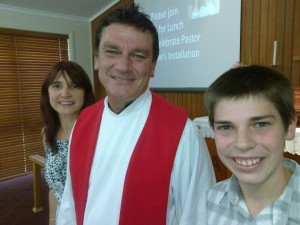Famous Last Words
Acts 1:8 (236)
 You’re watching an exciting movie on TV, and one of the characters is about to die. As he lies there on a hospital bed, he whispers some final words to his family. You quickly turn the volume up, but can’t quite hear what he says.
You’re watching an exciting movie on TV, and one of the characters is about to die. As he lies there on a hospital bed, he whispers some final words to his family. You quickly turn the volume up, but can’t quite hear what he says.
They may have been words of farewell, words of advice, words offering forgiveness, or maybe words that told the rest of the family where the treasure was buried.
People’s last words can often be significant. They can have some importance. They can even be remembered and passed down from one generation to the next.
And that’s the case when it comes to a number of “last words†that some characters in the Bible have spoken. We’re going to have a look at a few today and see what significance they have for us today.
We’re going to start with Moses. Towards the end of his life God took Moses up on to a mountain, and while he was there God showed him the land that the Israelites were going to inherit.
Just before he died, Moses pronounced a blessing on his people, and the last words of his blessing were these: Israel, you will live in safety; your enemies will be gone. The dew will fall from the sky, and you will have plenty of grain and wine. The Lord has rescued you and given you more blessings than any other nation. He protects you like a shield and is your majestic sword. Your enemies will bow in fear, and you will trample on their backs. (Deuteronomy 33:28,29).
In these last words of Moses, he acknowledged that Israel was very blessed because God was their Lord. He had led them safely through 40 years wandering in the desert, and was about to give them a country where they could settle down, grow crops and plant vineyards, have victory over their enemies, and live in security. They could be confident that God would continue to provide for them. God was in control.
Famous last words from Moses: God was in control!
Another very well known Old Testament character was David, King David. He had some “famous last words†as well. We read in 2 Samuel 23:3-5.  Our Mighty Rock, the God of Jacob, told me, ‘A ruler who obeys God and does right is like the sunrise on a cloudless day, or like a rain that sparkles on the grass.’ I have ruled this way, and God will never break his promise to me. God’s promise is complete and unchanging. He will always help me and give me what I hope for.
David was chosen by God to carry out a specific task. He was to make Israel a great nation, and bring honour and glory to God. David didn’t do this perfectly by any means. In fact, there are episodes in his life that can only be described as being very questionable.
But at the end of his life he could look back and see that through it all, it was only because of God that he and his kingdom survived. It was because of God’s covenant, God’s promise that David was able to achieve anything.
Famous last words from David: God was in control!
You might remember three men by the name of Shadrach, Meshach and Abednego. They were three friends of Daniel, who were thrown into a fiery furnace because they weren’t prepared to bow down and worship anyone but God himself. They were prepared to die and to remain faithful to God, rather than to obey King Nebuchadnezzar.
As they were about to be killed they cried out to the king: Your majesty, we don’t need to defend ourselves. The God we worship can save us from you and your flaming furnace. But even if he doesn’t, we still won’t worship your gods and the gold statue you have set up. (Daniel 3:6-18).
There was no way that they were going to turn their backs on God, because he’d never let them down. And even though it meant certain death for them, they were confident that God would watch over them
Famous last words from Shadrach, Meshach and Abednego: God was in control!
As it turned out, these weren’t their last words at all, because God rescued them, but they weren’t sure that he was actually going to, so we can still consider them being “famous last wordsâ€.
Then there was Simeon, a priest in the temple in Jerusalem. God had promised him that before he died, he would see with his own eyes, the fulfilment of God’s promise of a Saviour. Simeon would see Jesus.
So just after Jesus was born, Mary and Joseph took him to the temple; Simeon took the baby in his arms and said: Lord, now let your servant depart in peace, according to your Word. For my eyes have seen your salvation which you have prepared in the presence of all people; a light to reveal you to the nations, and the glory of your people Israel. (Luke 2:29-32).
Simeon thanked and praised God that he was able to see what God had promised hundreds of years before. He was prepared to die in peace, knowing that Jesus the Saviour had come. So “famous last words†for Simeon were that God was in control!
Not too many years afterwards a man called Stephen spoke some words too that have been acknowledged as being “famous last wordsâ€.
He’d preached a fairly strong sermon, and some people had taken exception to it because they couldn’t accept the fact that he’d said they were partly responsible for Jesus’ death. They dragged Stephen out of the city and began to stone him to death.
While they were stoning him, Stephen prayed: “Lord, Jesus, receive my spirit.â€Â Then he fell on his knees and cried out, “Lord do not hold this sin against them.â€Â When he had said this, he died. (Acts 7:59,60). Stephen was prepared to face death, confident that God would give him all he needed to remain strong in his faith, confident that God would take him to himself in heaven.
Stephen’s “famous last words†– God was in control even in the face of a difficult and painful death.
And that was very similar to another situation. When Jesus was hanging on the cross he spoke a number, seven in fact “famous last wordsâ€.  And the last of these was: Father, into your hands I commit my spirit. (Luke 23:46).
The work that he had come to do was completed, and he was giving up his life, so that we could have life after death. In the face of what seemed like failure and tragedy, Jesus acknowledged that God was in total control.
This was no unlucky and unhappy ending to Jesus’ life and ministry. It was the beginning of something new and exciting. There was no misfortune or catastrophe here. God was in control and everything was going to plan. Jesus’ resurrection from the dead was just around the corner.
But these weren’t really the last words of Jesus. Forty days after his resurrection, just before he ascended into heaven he spoke some “famous last words†again. He had his disciples gathered round him and said: The Holy Spirit will come upon you and give you power. Then you will tell everyone about me in Jerusalem, in all Judea, in Samaria, and everywhere in the world.  (Acts 1:8).
Jesus was leaving, but the Holy Spirit was coming. The disciples wouldn’t be alone. Jesus was going but nothing was going out of control. God the Father still had, and has, control over the work that Jesus began. Through his Spirit, this work was going to continue.
And through his Spirit that work continues today in and through God’s spirit-filled people – you and me. We look around and see what’s happening in our world, and even in God’s church at times, and wonder how we can ever be a positive influence, and what little good we can do.
But God’s still in control – and always will be. That’s his promise. That’s his “famous last words†if you like – words that he wants us to hold on to, to trust in, and to look on as being all that we need to continue to serve faithfully.
Have you ever thought what your last words may be? They may be words of farewell, words of advice, words offering forgiveness, or maybe even words that let your family know where the treasure is buried.
Whatever you last words may be, you can be sure that as you face death, you can be absolutely confident that death is not the end of your existence. Christ has overcome death, and nothing can ever separate you from his love.
But this assurance is yours not just as you face death – it’s also there for you as you face life, and all the difficulties and challenges that you have before you.
God was, and God is, in control. Amen.
Bishop Mark Leischke

